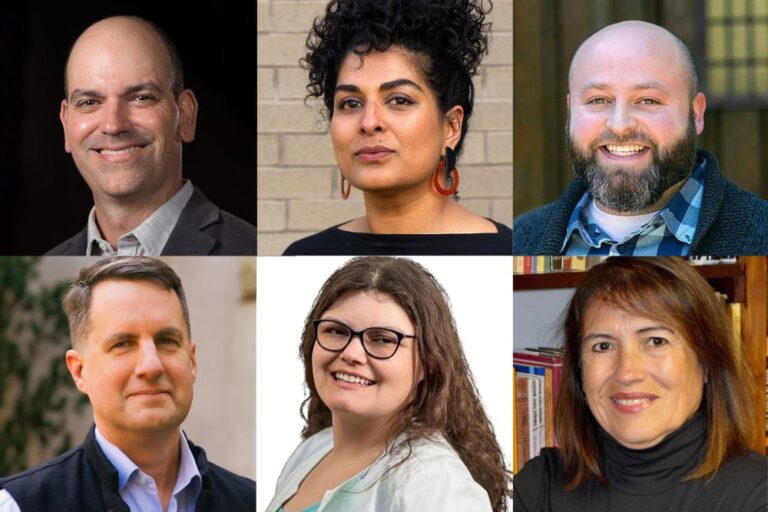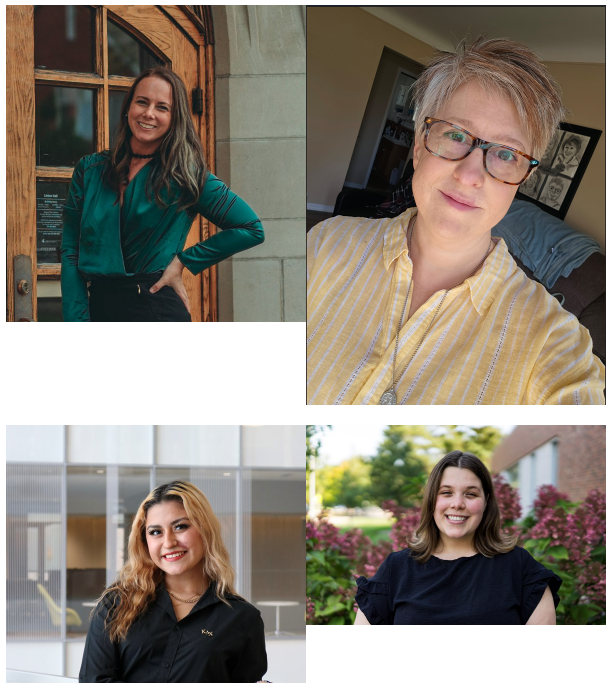The inaugural roster of 1855 Professorship recipients, along with MSU administrators, Board of Trustees members, faculty, and guests, recently gathered for dinner in the Michigan State University Club Fireplace Room in celebration of this first cohort of Spartan professors who are dedicated to advancing Michigan State University’s diversity, equity, and inclusion (DEI) objectives.
Included in this first cohort of 1855 Professors are Blaire Morseau and Elan Pochedley, who are both Assistant Professors in the Department of Religious Studies and 1855 Professors of Great Lakes Anishinaabe knowledge, spiritualities, and cultural practices.
The celebration, held in early December, gave the seven 1855 Professors who make up the inaugural roster the opportunity to engage in conversation and begin building connections across the cohort.

The event included remarks by Interim President Teresa K. Woodruff, Ph.D., and Interim Provost Thomas D. Jeitschko, Ph.D. The 1855 Professorships were created under the leadership of then Provost Woodruff who shared her enthusiasm for the 1855 Professorships’ “wonderful beginning to an exciting future.”
Jeitschko echoed Woodruff’s remarks and said, “The goal is for these scholars to grow together and support each other as professionals, researchers, and individuals.”
Each 1855 Professorship recipient also addressed the audience to briefly introduce themselves and discuss the themes and goals of their transformative work.
Blaire Morseau
Morseau, a citizen of the Pokagon Band of Potawatomi Indians, focuses her research on Indigenous science fiction and futurism, traditional cultural and ecological knowledge, digital heritage, and Native counter-mapping. She will teach a class on Native American Religions (REL 306) in the Spring 2024 semester that will explore the artwork, literature, politics, and other Indigenous spirituality of Native American peoples.
In addition to her research and teaching, Morseau currently is working on a digital humanities project at the MSU Digital Scholarship Lab, which involves uploading Potawatomi knowledge of star constellations onto a digital platform that can be accessible to Potawatomi people as well as astronomers and teachers.

Morseau also just released, in October 2023, an edited volume, titled As Sacred to Us: Simon Pokagon’s Birch Bark Stories in their Contexts, which features the collection of 19th– and early 20th-century birch bark books written by Potawatomi author Simon Pokagon. She will give a talk on this book on Friday, Jan. 19, from 11:30 a.m. to 1 p.m. at MSU’s Main Library in the Green Room, located on the fourth floor. Lunch will be provided for attendees. The talk and lunch are free, but registration is required by submitting the RSVP for Dr. Blaire Morseau’s Luncheon Book Talk. This event is sponsored by the American Indian and Indigenous Studies Program, Department of Religious Studies, MSU Libraries, and MSU Press.
For more information on Morseau and her work, please see the article, “Religious Studies Professor Returns to Her Native Community for 1855 Professorship,” which was published on the College of Arts & Letters site on November 10, 2023.
Elan Pochedley
Pochedley, a member of the Citizen Potawatomi Nation, focuses much of his research and teaching on understanding the sustainable stewardship that Native Americans have demonstrated toward waters, plants, fish, wildlife, and their food systems.
His research not only focuses on the environmental hardships that Anishinaabe people have endured but also their ability to navigate changing environments so as to continue their practices of care and sustainable ways of living through tools they have adopted or developed. He’s not just interested in Anishinaabe history but in Anishinaabe presences, the ongoing sovereign legal status of Anishinaabe nations, the practice of their rights recognized or reserved under treaty agreements, and their visions of the future.

Helping Michigan State University make connections with Anishinaabe tribes is a key part of Pochedley’s vision for the 1855 Professorship. He currently is working to bring guest speakers to the MSU Museum in Spring 2024 to discuss the history of wild rice harvesting practices and ecological restoration efforts. He also will teach Exploring Spirituality (REL 102) in the Spring 2024 semester, which will examine Indigenous peoples’ and other communities’ philosophies, traditions, and ways of understanding spirituality.
For more information on Pochedley and his work, please see the article, “1855 Professor: Researching and Teaching Native American Environmental Ethics,” which was published on the College of Arts & Letters site on November 17, 2023.
More on 1855 Professorships
Named for the year the university was founded, the 1855 Professorships were created by the Office of the Provost to elevate the academic quality and reputation at MSU with the goal of advancing MSU’s strategic and diversity, equity, and inclusion priorities. The initiative aligns with the university’s 2030 DEI strategic theme and the DEI Report and Plan.
The 1855 Professorships are one of the many initiatives Michigan State University is taking to become a national leader in increasing diversity, promoting inclusion, ensuring equity, and eliminating disparities by transforming the impact made on underrepresented communities, on MSU’s campus and beyond.
These professorships were developed to form a cross-disciplinary group of professors to work together to advance MSU’s DEI objectives, enhance collaborations campuswide, and foster new partnerships.
The 1855 Professors were selected for their contributions to DEI-related scholarship.
“There was a thorough process for finding the right fit,” Jeitschko said. “We searched for professors who work across disciplines and will contribute to our DEI advancements.”
Besides Morseau and Pochedley, the other 1855 Professors who are part of the inaugural roster include:
- Danielle Brown, Associate Professor, School of Journalism, College of Communication Arts and Sciences – 1855 Professor of Community and Urban Journalism
- Blair Burnette, Assistant Professor, Department of Psychology, College of Social Science – 1855 Professor of Racial and Ethnic Health Disparities
- Guanqun Cao, Associate Professor, Department of Computational Mathematics, Science, and Engineering and Department of Statistics and Probability, College of Natural Science – 1855 Professor of Algorithmic Bias
- Samantha Gailey, Assistant Professor, Department of Forestry, College of Agriculture and Natural Resources – 1855 Professor of Forests and Green Spaces for Positive Public Health and Environmental Equity
- John Kuk, Assistant Professor, Department of Political Science, College of Social Science – 1855 Professor of Minority Politics and Urban Education Policy
In Spring 2024, a new recruitment cycle will begin to search for additional 1855 Professors.


